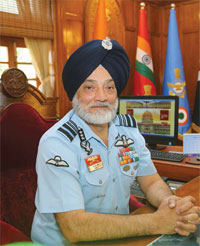
The National Defence Academy (NDA) is the premier joint training institution and centre of excellence in the world for producing leaders, equipped with intellectual, moral and physical attributes required to cope with the challenges of future battlefields and capable of leading troops to victory. An insight into this iconic military academy that produces valiant officers of the Indian Armed Forces
In the words of Air Marshal Jasjit Singh Kler, the present Commandant, the National Defence Academy is an iconic institution and hallmark of global excellence in the sphere of military education. Over the years it has emerged as a unique military academy, attracting the best of youth from our nation and also from friendly foreign countries and transforming them into Scholar Warriors. During the last six decades of its glorious existence, the National Defence Academy has grown both in grace and grandeur and from its portals have emerged ‘Leaders of Men’, who have demonstrated the essence of inter-services camaraderie and jointmanship thereby vindicating the faith and vision of its founding fathers.
Air Marshal Kler, a third generation soldier and recipient of the Vayu Sena Medal, possesses amazing acumen in helicopter flying having amassed 8000 hours, mostly in Siachen and the Eastern Sector. His deep passion and pride in moulding over 2000 teenagers into dynamic officers of the three wings of our Armed Forces, is admirable. Corporate Citizen interviews this tenacious NDA Commandant who gives an in depth insight into the tough and comprehensive training in academics, warfare, technology and the mastering of mind and body to transform a bumbling teenager into an Officer and a Gentleman…
We get young children who have completed the 10+2 education. They go through a very rigorous system of appearing for pre-admission test to the NDA through the Union Public Service Commission (UPSC). Then they go to the various Service Selection Boards (SSBs) which have a scientific system to assess cadets and that is where the culling takes place. Their method is so precise that 99% of the time, they pick out the best. So, when the cadets come to NDA, they have gone through the second sifting, so to say.
They come from rural as well as urban backgrounds. But the thing they have in common is the glint in their eyes and fire in their belly. When somebody walks in, I can immediately tell whether this guy has a problem and I am right, nine times out of ten. Having trained so many people, I can make such an assessment. They don’t know what they are getting into but they are aware that 1.3 billion people will look up to them because they will represent honour and integrity when they don the uniform. That is the only common bond which binds them when they come here.
Our intake per semester is 250-350 cadets. We can take in a total of 2,100 cadets in six terms. We divide these fresh cadets into five battalions. Each battalion has got four squadrons. So when they come here, we distribute them among the squadrons. And the best part is they don’t get to see each other till they pass out. They are being mentored by the seniors. Presently, 137th course is coming in, but 131st course has passed out. Cadets after passing out go to finishing academies like the Indian Military Academy, Indian Naval Academy and the Air Force Academy.
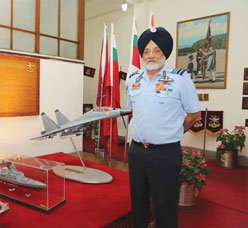
We have a strict regimen comprising 80% academics and 20% physical training. However, it is the 20% physical regimen which is a killer. So out of every course, there are relegations. Relegation means a cadet who does not make it and is relegated to the next course. He can be relegated under many circumstances. It could be discipline, medical problems, studies, or it could be physical regimen. Mostly, cadets get relegated for lack of physical attributes. On an average, we have about six cadets who get relegated and around four go home because if anyone is caught in an act of moral turpitude, he is withdrawn. We cannot accept such cadets in the Armed Forces. We have got a very clear set of attributes required for an officer.
Ethos, Values, Camaraderie, Team Spirit and Leading from the Front. It is well structured and is called the Academy Honour Code. He has to abide by this honour code in every action. Even while breaking bread, there is an Honour Code on how he eats, how he passes dishes to the other person, how he uses his fork and knife and so on. That’s why I tell these cadets, once you clear our regimen, then you are incomparable, you stand apart.
If you dig deep into these children who face relegation, it is always to do with their family backgrounds. They have to forget where they came from.
But then they test the system. They are told very clearly by the Academy Adjutant when they come in, as to what is expected of them here. This is an officer, specially selected from the Armed Forces and you will see him on a horse at the parade ground. He ensures discipline of the cadets on the parade ground and otherwise. Maj PK Rathore is presently the Academy Adjutant. We have transgressions, for which we have a set system of negative points. It is called earning negative points. Every action has got a point. When you earn 180 negative points in a term, the cadet is relegated. So he is given enough chances. There have been very special circumstances when we bring them back. After all, we are playing with their lives. I can’t afford to give a wrong decision. So when I sit on judgment here, I have to be very careful myself.
“When we get these children, they really come with pink cheeks. They don’t have muscle on the torso. We have a scientific way of building their muscles. The NDA cadets are the best in the country as far as endurance is concerned. Their physical and mental toughness is incomparable”
You are actually right. When we get these children, they really come with pink cheeks. They don’t have muscle on the torso. We have a scientific way of building their muscles. The NDA cadets are the best in the country as far as endurance is concerned. Their physical and mental toughness is incomparable. We have a number of sports facilities here. It toughens them up. There is also a jump from 10 meters into a swimming pool. And it is not just a jump. It is his commitment, courage, following of orders and trying to master his fear that spurs him to make that leap of faith. Anybody who can’t jump from 10 meters is relegated. For, it implies that the boy cannot overcome his fear. All this counts for points to the squadron for the Banner. Banner is the ultimate glory for them. A Banner is given to the Squadron that stands first, so this is extremely important.
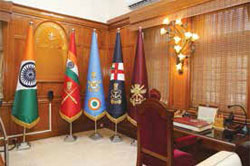
There is no ragging. There is only ‘toughening’. Even I as the Commandant will do 50 push ups if I do something wrong. I don’t mind doing it because that’s the way we have been brought up. This is toughening of the cadet. That means, you are doing an endurance run or an endurance hike which is not a punishment, really. It is toughening and they undergo it as their reputation and that of their Squadron is at stake. We have something called the Academy Honour Board, which honours the commitment that they made and work as a team, not alone. There is no physical punishment given in the academy. The best part is that the Divisional Officers and Squadron Commanders keep an eagle eye on all these issues and they are a part of their toughening. Whenever these boys run, they are there with them.
It is not about physical stamina when they do a 12.5 km run or a 23, 33 or 52 kms run with a backpack. The last few miles are covered because of mental, not physical strength. All cadets here may be wiry but they have got great upper body strength, muscle and endurance.
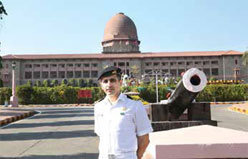
The UPSC exam is extremely tough in the sense that the percentage of candidates who get through the written and the SSB thereafter is very low. So only the special few come to us. We have just commenced B Tech for the Navy and we’re in the process of introducing it for the Air Force cadets as well. All cadets here are given a laptop when they join the academy. They are thin clients connected to the Campus Area Network. Every room of every squadron has connectivity with the CAN. They have six to eight periods of classes every day and we have the best academicians teaching them. Let me tell you, a cadet may be good in outdoor activities but if he doesn’t make it in academics, he gets relegated to the next term. We have a very strict system of monitoring the cadets. This is one of the very few military academies in the world after WestPoint, USA and the PLA National Defence University in China that give such weightage to academics. During the non-academic hours, a cadet has to make sure he is physically fit. Every cadet has to be physically fit and intellectually capable. We are looking for scholar boys who stand on moral high ground and are extremely motivated. What gives me ultimate happiness is, when they pass out of the academy, they are a changed lot. The system has withstood the test of time and is working well. The feedback that from the finishing academies - that is the IMA, AFA and INA is positive. They go for the ex-NDA brand and it is a matter of great pride for us.
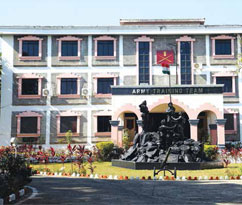
We offer Bachelor of Arts (BA), Bachelor of Science (BSc) and Bachelor of Technology (B Tech).
All NDA cadets wake up at 0500 hrs (5 am) to the sound of the morning reveille. They get ready by 0615 hrs and do their PT or Drill until 0800 hrs. Then they go the mess for breakfast. Breakfast, lunch and dinner is served by an army of waiters to 2000 cadets. They get piping hot food. Each cadet takes in about 4600 calories because he burns so many calories. After breakfast at 0830 hrs he attends classes in the classrooms which continue till 1350 hrs. This is followed by lunch break. Lunch again is to be finished expeditiously. Immediately after lunch is the Squadron Period. During these Squadron Periods, things like ‘Military Virtues’ ‘Social Graces’ and ‘Jointmanship’ are taught to them. This goes on till 1600 hrs. From 1600 hrs to 1800 hrs he participates in PT, games, swimming, boxing etc. Each cadet has to compulsorily play two troop games and one racquet game. This is followed by self-study which starts at 1825 hrs and goes on till 1950 hrs. Their dinner time is between 2030 hrs to 2115 hrs. Lights are out at 2215 hrs and believe you me, when they crawl into their beds, they are exhausted. This is the routine which they follow.
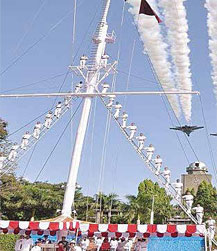
The food they get is of a very high quality and the high standard is maintained by means of stringent norms. We have five fireless kitchens. These modern kitchens churn out food at a very fast rate. The intriguing bit is, that you will never get the odour of food in the cadets’ mess.
It is difficult to tell you in terms of money, but I’ll tell you in terms of calories. That’s what is more important to us. A cadet takes in about 4600 calories in a day. We have to ensure that his diet is absolutely balanced. Both vegetarian and non-vegetarian diet is looked at very carefully and a good quantity of food comes directly on the table in smart utensils. It is not given to them in portions. Each cadet is given 20 minutes to eat his food. The entire cadets’ mess is on the CCTV cameras. We monitor how he eats his food, how he sits down, what are his eating habits and the Divisional Officers are always there, watching the cadets with an eagle eye. The calorie intake is monitored very carefully. Even if one cadet misses a meal, it is reported to me by the Deputy Commandant. And that is for my worry, as to why did he not have a meal. Is he unwell, where did he go, and so on.
The mess has been extended recently and can accommodate 2000 cadets. There is a mentor to every young boy who comes in and they are seated squadron-wise. The Champion Squadron who gets the Banner, always sits opposite the Commandant. They learn to break bread together. Eating is a very sacred activity as far as we are concerned. We eat food together.
Behind the dining hall, there are five kitchens where we have an army of very loyal civilian cooks and waiters who have been here for many years, who have seen cadets pass out and become Generals and remember them very fondly. The aroma and the taste has remained the same over the years. We have four large cold rooms where we can store food for any kind of contingency and emergency. The doctors come and check this food every day in the morning and a 24 hour sample of the food is preserved and checked again after 24 hours. I personally monitor the quality of food and an officer of the rank of Brigadier takes feedback from the cadets. We have to focus more on the vegetarian cadets because they need to consume more calories. So, the mess and the quality of food is my thrust area. I cannot afford to have an incident as far as the mess is concerned.
“A cadet takes in about 4600 calories in a day. We have to ensure that his diet is absolutely balanced. Both vegetarian and non-vegetarian diet is looked at very carefully and a good quantity of food comes directly on the table in smart utensils. It is not given to them in portions. Each cadet is given 20 minutes to eat his food”
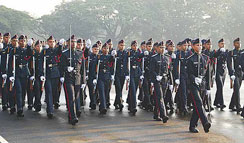
The jewel is the Cross Country because that’s an endurance run of 12.5 kms run at full tilt. We also have three camps, Camp Greenhorn, Camp Rover and Camp Torna. The cadets run a distance of up to 52 kms in these camps. Camp Rover, by the way is the toughest camp in the world in this age group. Squadrons are awarded marks for each camp. It isn’t only the cadets, but even the Divisional Officers and Squadron Commanders are totally immersed because it is a matter of pride for them in case their squadron does well. We don’t want individual sparks of brilliance. We need team players, who the men can trust.
We have had heads of the American Forces who visited us recently. We also had the Chief of the UK Armed Forces. We stand apart as far as uniqueness is concerned, because we are in a constant state of low intensity conflict. Other nations are not sending their children to war in their own country. In our case, our officers, when they join the Army, Navy and Air Force are seen on the border. You always see them on the front and that is where an ex- NDA proves his mettle. We recently lost four ex-NDAs, two in the Nagrota attack. Whenever I speak of this, my heart actually wells up. I tell these cadets that these two officers have been in these very chairs that they sit in. They were all of 24 years but they knew if they didn’t get those terrorists in Nagrota, there will be a hostage situation. They barricaded themselves to save families. They lived and fought the way they were trained. This is who we are. This is what we do. We lead from the front. I am happy to inform, that we have two instructors who are Kirti Chakra awardees. This is the second highest peace time award.
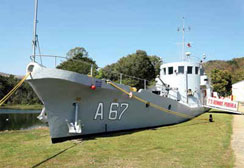
It is work in progress as far as clubs are concerned. I still want to improve on them. These clubs also instill and inject the right amount of courage, commitment and stamina in the cadet. We have 30 clubs, out of which 20 are outdoor clubs. The clubs that are most sought after are the sailing club, and the running club. Our cadets recently got accolades in a unique Triathlon held at Goa. It included cycling, running and rafting. Our cadets have also done extremely well in marathons. We also have clubs like Drama Club, Cycling Club, Photography, Western Music etc. Our horse riding club is also renowned. A cadet won Gold at the national level. These clubs also act as a stress buster and the co-curricular activities add to the over personality and skill set of a cadet.
They do it either in the afternoons on club days or in term breaks. There is a mid-term break and a term break. They themselves elect to stay back for these activities. On Sundays, when the routine is relatively free, they are free to visit these clubs. The boys have done well in trekking and mountain climbing. In the recently conducted Adventure Activity, our cadets stood second. To give you the essence of NDA, it all boils down to one little incident. In the triple event our boy was cycling and he was ahead of the others. Suddenly, his wheel came off on a down slope and he crashed on the ground, injuring himself. Without thinking, he picked up his bicycle and started running the rest of the nine kms. He was running, lifting his cycle up while others were cycling. This boy stood second, beating 21 others in the team. Look at the spirit; he did not want to let NDA down. We are ex-NDAs, we always lead from the front It was one of our most defining moments. This boy was injured and bleeding, but he still ran—this is the NDA spirit.
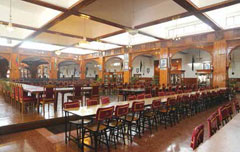
The Hut of Remembrance exists in every training institution. The walls are getting covered faster than we can make them. It’s like a religious place for us, and for the cadets. Every course which passes out pays homage here because officers who sacrificed their life for the country were all cadets once. We are soldiers. We all know there is an element of risk. So we all go there together and a silent prayer goes up from our side as far as these soldiers are concerned. Deep down, there is a sense of loss as far as I am concerned. We recently lost four ex-NDAs in two days, two in the helicopter crash in the East and two at Nagrota. I keep telling my cadets that these people are now in the astral world and they look down at you and they guide you. So we have to give that commitment to them. It’s an incredible legacy these cadets inherit because these people in the Hut of Remembrance - they walk with you. I also tell them, ‘Lead from the front. When you were born, you were destined to die. It is how you die which is more important’. Would you like to die of old age, or would you like to die leading from the front? You can see the fire raging in their eyes because these people are behind us. I always bow my head when I cross the HOR.
We have a robust Campus Area Network and we have also hooked onto something called the National Knowledge Network. We are connected to the IITs via the NKN. We are also connected to all training institutions of the Army, Navy and Air Force. Video Conferencing facilities are also available. Our cadets can attend B Tech lectures remotely. The NKN is a stockpile of useful information for the cadets.
Each cadet has a laptop. He plugs in this laptop in his classroom, in his room in his squadron and in the library, which is rather well stocked. He doesn’t have to pick up that proverbial pencil and take notes. He goes straight to his laptop and goes about his learning. It helps us save a huge amount of time as far as cadets are concerned. We also plan to provide 100 tablets to the B Tech cadets
“We have 30 clubs, out of which 20 are outdoor clubs. The clubs that are most sought after are the sailing club, and the running club. Our cadets recently got accolades in a unique Triathlon held at Goa. It included cycling, running and rafting. Our cadets have also done extremely well in marathons. We also have clubs like Drama Club, Cycling Club, Photography, Western Music etc. Our horse riding club is also renowned”
The Armed Forces are becoming increasingly technology oriented with time. But in the end, the last green mile or the golden mile is walked by the boots on ground. Towards that extent, we are abreast with the technological developments in the Army, Navy, and Air Force. We have the Army Training Team, Naval Training Team and the Air Force Training Team. This is where we teach service specific subjects. I am still a migrant into such technology. These cadets come armed. They are already well versed with technology. I also get feedback from the field saying that these boys are very quick to learn about the technology in the Su-30s, or MIG-21s, or the Bofors, the UAVs etc.
We’ve also started a new system of tracking the cadets on our mobiles through GPS trackers during camps and navigation exercises. They are not very happy about this because they don’t want to get caught. They would rather sleep somewhere when they are tired. We can now pick them up on the tracker system.
There are no mobiles allowed in National Defence Academy. We feel it’s a distraction. Every squadron has been given six STD phones for the cadets to use. I am keeping an open mind though. May be 10 years from now, things will change. May be they will have smart watches with mobiles. Presently this is working for me, but we are ready to change. So yes, I have a very open mind on this.
We have a large number of water vessels in Peacock Bay. We have 160 boats that can be used on this 21 kilometre lake. Cadets have won accolades even in sailing. I insist that all officers go into these waters as it gives you a sense of adventure. Kayaking is also a fun activity that requires a lot of skill. I even encourage wives of officers to participate in these activities.
I am a reluctant M Phil. It was imposed on me. I am a soldier. I do one thing best, that is flying. I have clocked 8,000 hours of helicopter flying. I do not want a second career. I’d rather go and play my Golf. I have done my duty for 38 years. I have two years left to retire.
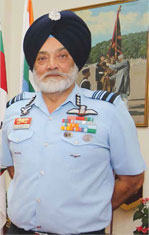
My grandfather joined the British Army in 1904 in an armoured unit called Skinner’s Horse, a renowned regiment. In 1948, my father joined the 18th Cavalry, a very famous regiment. My brother is a serving Major General in the Armoured Corps. So, in my case, I had nowhere else to go. Only thing I realised when I was a child that I am pretty good with my hands and feet and I will fly fairly all right. So I joined the Air Force. So yes, there is no other way I would have had it.
The most memorable moment was saving 15 lives in the Valley and bringing those 15 injured soldiers back to Military Hospital (MH) Srinagar.
This was between 1991 and 1995. I picked up the soldiers with gunshot wounds and brought them back. I didn’t even have the permission to do so. I have been doing this all my life. I mean, if you do a good deed, nothing will happen to you.
During NDA Ball, all officers and ladies are dressed in their finery. What I mean to say is that the officers are in their uniform, the ladies are very graceful in their sarees. The cadets are also in their uniforms and this is where the cadets make their first mass contact, with girls. The NDA Ball is an extremely sought after event. It is a very happy and sombre occasion. It also helps us in actually advertising these youngsters who are going to join the forces. I am happy to inform you that last time 200 plus girls came from all corners of the country, which is no mean feat. It speaks volumes of the parents who left these girls in our safe custody and we ensured that they returned home safely. Who would leave their daughters to come in and dance the night out? We also selected the best dancing couple for boys and girls and they were awarded gifts. It was a great success. The feedback I got from the girls was that they would love to come again for the NDA ball because of the dignity, poise and grace that is associated with it. Also, another interesting fact is that nuptial unions are made here. Last NDA Ball, we had three marriages.
Bash on regardless!
by Vinita Deshmukh